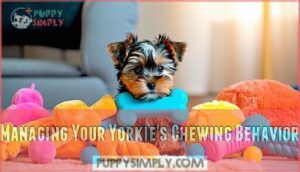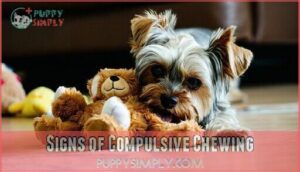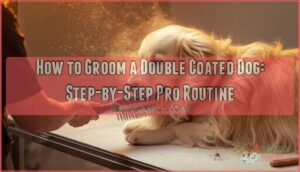This site is supported by our readers. We may earn a commission, at no cost to you, if you purchase through links.

Their chewing stems from natural puppy development, stress relief, and attention-seeking behavior. The good news? Their small size limits the damage they can inflict.
With proper training, appropriate chew toys, and consistent boundaries, you can redirect their natural chewing instincts toward safer outlets and protect your belongings from those tiny but determined teeth.
Table Of Contents
- Key Takeaways
- Are Yorkshire Terriers Big Chewers?
- Why Do Yorkies Chew Everything?
- Managing Your Yorkie’s Chewing Behavior
- Best Chew Toys for Yorkshire Terriers
- When Yorkie Chewing Becomes Problematic
- Frequently Asked Questions (FAQs)
- How long does the teething phase in Yorkies typically last?
- Are there any specific toys that are recommended for Yorkies who are big chewers?
- Can diet influence chewing habits in Yorkies?
- Are older Yorkies prone to increased chewing?
- What household items most attract Yorkie chewers?
- How does exercise level affect Yorkie chewing?
- Is nighttime chewing common in Yorkshire Terriers?
- Conclusion
Key Takeaways
- Your Yorkie’s chewing ramps up during teething (4 to 8 months), so be ready with safe chew toys.
- Boredom and anxiety can turn your Yorkie into a tiny destroyer—keep them busy and calm.
- You can’t “cure” chewing, but you can train and redirect it with consistent boundaries and the right toys.
- Persistent or intense chewing might signal stress, a health issue, or that your Yorkie needs more stimulation.
Are Yorkshire Terriers Big Chewers?
Yorkshire Terriers exhibit moderate to strong chewing tendencies, particularly during their teething phase between 4 and 8 months of age.
You’ll notice your Yorkie’s chewing behavior intensifies when they’re bored, stressed, or seeking comfort, making proper management essential for protecting your belongings.
Natural Chewing Instincts in Yorkies
Like their terrier ancestors, Yorkies possess instinctual chewing drives rooted in evolutionary hunting behaviors. These puppies naturally explore their world through mouth contact, making chewing a normal developmental stage.
Your Yorkie’s chewing intensity varies based on individual temperament and breed-specific traits. Training redirects this natural behavior toward appropriate outlets rather than eliminating it entirely.
Teething Phase Intensity (4-8 Months)
Your Yorkie puppy’s chewing reaches peak intensity between 4-8 months during their teething timeline. As 28 baby teeth shed and 42 adult teeth emerge, Yorkie puppies experience significant discomfort requiring pain management through appropriate toy selection.
You’ll notice behavioral changes like increased drooling, swollen gums, and excessive chewing. Note that Yorkies begin to grow their milk teeth early.
Effective soothing techniques include frozen treats and teething-specific toys sized for small mouths to prevent dental problems.
Stress and Boredom Chewing Patterns
Beyond teething, your Yorkie’s chewing often signals deeper issues. Anxiety-Induced Chewing emerges when you’re away, targeting shoes or furniture for Boredom Relief.
The energetic Yorkie temperament craves Mental Stimulation—without it, destructive behaviors surface.
Environmental Enrichment and Redirection Strategies help identify Chewing Triggers. Understanding your Yorkie personality helps you provide appropriate Training Tips before problems escalate.
Why Do Yorkies Chew Everything?
Your Yorkie’s chewing behavior stems from several behavioral triggers that you can identify and address. Understanding these root causes helps you redirect their natural instincts into appropriate outlets rather than your favorite shoes.
Understanding your Yorkie’s chewing triggers helps you redirect their natural instincts toward appropriate outlets instead of your belongings
Puppy Teething and Discomfort Relief
Yorkie puppies experience intense discomfort during teething, making chewing their primary coping mechanism. The teething timeline usually spans four to eight months, with peak intensity occurring around five months.
Relief methods help manage their discomfort effectively:
- Frozen chew toys provide cooling relief for inflamed gums
- Puppy-safe gels offer temporary numbing for severe soreness
- Safe chewables redirect destructive habits onto appropriate items
- Soothing techniques like gentle gum massage reduce inflammation
- Professional monitoring prevents potential dental problems from developing
Anxiety and Separation Issues
Anxiety strikes when you’re not around. Separation anxiety affects 18% of Yorkies, who form intense bonds with their families. Your absence triggers destructive chewing as a calming technique.
Yorkies target exits, furniture, and personal items during owner absence. This behavioral intervention requires understanding your Yorkie’s temperament and implementing consistent Yorkie training methods.
Owners should be aware that excessive barking is also a common sign of separation anxiety.
Lack of Mental Stimulation
Smart Yorkies need enrichment activities to prevent destructive chewing behaviors. Without puzzle toys, training games, and interactive play, their high energy level transforms everyday items into chew toys.
The Yorkie temperament craves mental challenges—boredom busters like treat-dispensing toys redirect their trainability into positive outlets. This Yorkie personality trait makes consistent enrichment essential for peaceful coexistence.
Attention-Seeking Behavior
Your Yorkie’s chewing often stems from wanting your attention. This intelligent breed quickly learns that destructive behavior gets immediate responses. Their temperament drives them to seek interaction constantly.
- Ignoring unwanted chewing while rewarding calm behavior teaches better habits
- Consistent attention throughout the day prevents attention-seeking triggers
- Interactive playtime satisfies their Yorkie personality needs
- Training sessions redirect their intelligence positively
- Understanding Yorkie temperament helps predict when they’ll act out
Managing Your Yorkie’s Chewing Behavior
You can control your Yorkie’s chewing habits through structured management techniques that address the root causes of destructive behavior.
Implementing consistent training methods and environmental modifications will redirect your dog’s natural chewing instincts toward appropriate outlets.
Puppy-Proofing Your Home
Creating safe environments protects Yorkshire terrier puppies from destructive chewing incidents. Remove electrical cords and secure valuables before bringing your family dog home. Establish safe zones where supervised playtime occurs during early training and socialization phases.
| Area | Action Required |
|---|---|
| Living Room | Secure valuables, cover electrical cords |
| Kitchen | Remove toxic substances from lower cabinets |
| Bedroom | Create designated safe zones for rest |
| Yard | Install proper fencing, remove hazards |
Redirecting to Appropriate Items
When your Yorkie grabs your favorite shoes, immediately offer a safe chewable alternative. Keep chew toy variety accessible throughout your home for quick redirection.
Toy rotation prevents boredom – swap items weekly to maintain interest. For persistent chewers, DIY chew toys using frozen treats work well.
Taste aversion sprays protect furniture while encouraging appropriate chewing. Consistent redirection teaches your Yorkshire terrier proper boundaries during training sessions.
Establishing Consistent Boundaries
Consistent boundaries prevent your Yorkshire terrier from developing selective hearing about chewing limits. Set clear expectations from day one about which items are off-limits. Use the same commands and reinforcement strategies every time your Yorkie approaches forbidden objects.
Owner consistency matters more than precision – your temperament during boundary maintenance shapes their training aptitude and long-term socialization success.
Using Positive Reinforcement Training
Reward-based learning works best with Yorkshire terrier training since their temperament responds well to consistent praise. Your Yorkie’s training aptitude shines when you avoid punishment methods that can damage trust.
Here are three effective approaches:
- Clicker Training – Mark good behavior instantly when your Yorkie ignores forbidden items
- Consistent Praise – Use the same enthusiastic "good dog!" every time they choose appropriate chew toys
- Shaping Behavior – Gradually reward your Yorkie personality for making better chewing choices throughout the day
Best Chew Toys for Yorkshire Terriers
You’ll need the right chew toys to redirect your Yorkie’s natural chewing instincts toward safe, appropriate items.
Selecting toys that match your dog’s size and chewing strength prevents dental damage while satisfying their behavioral needs.
Size-Appropriate Safe Options
Proper toy sizing prevents choking hazards for your Yorkie. **Choose toys specifically designed for toy breeds under 10 pounds.
** Avoid anything that fits entirely in your Yorkie’s mouth—safety comes first.
Non-toxic rubber options and reinforced plush toys with secure stitching work best. Natural cotton rope toys help with teething while cleaning teeth.
Durable Toys for Strong Chewers
Some Yorkies need heavy-duty options when standard toys don’t last. Kong Classic and Nylabone DuraChew provide high-quality toy material safety for persistent chewers. These textured chew options feature reinforced construction that extends chew toy longevity substantially.
West Paw’s guaranteed durability makes them ideal interactive treat toys. Always maintain supervised playtime to monitor your Yorkshire Terrier’s chewing intensity and replace worn items promptly.
Interactive Puzzle Toys
Challenging your Yorkshire terrier’s mind through puzzle toys transforms simple treat time into cognitive enrichment. These treat dispensing devices require your Yorkie to work for rewards, reducing boredom-related chewing while exercising their intelligence.
Choose puzzle toys with adjustable difficulty levels and easy cleaning features. Durability matters since many Yorkies can solve puzzles quickly, requiring sturdy construction to withstand their playfulness during dog training sessions.
Dental Health Chew Products
Beyond keeping your Yorkie’s teeth clean, dental health chew products serve multiple purposes for breed-specific oral care needs. Choose chews with safe ingredients that provide plaque prevention and tartar control while offering gum massage benefits.
These products help with breath freshening and dental disease prevention, reducing the need for frequent dental cleanings and supporting overall dental health between veterinary dental checkups.
When Yorkie Chewing Becomes Problematic
You’ll know your Yorkie’s chewing has crossed into problematic territory when they consistently target valuable items or show compulsive behaviors that ignore redirection attempts.
Watch for signs like repetitive chewing motions, anxiety-driven destruction, or obsessive focus on inappropriate objects that requires professional intervention.
Destructive Vs. Normal Chewing
Understanding your Yorkie’s chewing behavior helps you distinguish between Normal Puppy Chewing and problematic patterns. Yorkshire Terriers naturally chew during Teething vs. Destructive phases, but excessive destruction signals deeper issues. Identifying Root Causes like Anxiety-Related Chewing or Boredom-Induced Chewing guides effective Yorkshire Terrier Training approaches that address your dog’s specific Temperament needs.
- Normal chewing targets appropriate toys and occurs during predictable teething periods
- Destructive behavior involves expensive furniture, shoes, or dangerous household items
- Anxiety-related patterns emerge during owner absence or environmental changes
- Boredom-induced destruction happens when mental stimulation needs aren’t met
- Root cause identification requires observing timing, triggers, and your Yorkie’s emotional state
Signs of Compulsive Chewing
When your Yorkie’s chewing crosses into compulsive territory, you’ll notice distinct warning signs that require immediate attention.
| Normal Chewing | Compulsive Chewing |
|---|---|
| Occasional, purposeful activity | Repetitive, ritualistic patterns |
| Reacts to redirection easily | Difficult to interrupt or distract |
| Stops when needs are met | Continues despite consequences |
| No self-harm occurs | May cause physical injury |
Watch for excessive chewing duration lasting hours, chewing self-harm like raw paws, ingestion indicators of non-food items, obsessive toy focus, and chewing displacement behavior during stress.
These temperament changes in your Yorkshire terrier signal the need for professional intervention beyond basic training approaches common to most dog breeds.
Professional Training Solutions
When compulsive patterns persist despite your efforts, professional dog trainers offer specialized expertise. The temperament of the Yorkshire terrier responds well to structured approaches that address underlying behavioral triggers.
Professional training programs focus on:
- Behavior Modification protocols that target specific chewing triggers through systematic desensitization
- Specialized Obedience training combined with impulse control exercises suited to Yorkshire terrier intelligence levels
- Anxiety Management techniques including crate training and environmental enrichment strategies
Expert guidance provides personalized solutions that match your dog’s unique behavioral profile and training needs.
Veterinary Consultation for Excessive Chewing
When training doesn’t resolve chewing problems, veterinary consultation becomes necessary. Your vet will examine potential health conditions like dental disease or nutritional deficiencies that trigger excessive chewing.
Diagnostic tests can identify underlying health issues, while behavioral therapy and medication options address anxiety-related chewing causes in your Yorkie.
Frequently Asked Questions (FAQs)
How long does the teething phase in Yorkies typically last?
Most Yorkie puppies start teething around three months old, and the whole process usually wraps up by eight months. During this “baby shark” phase, keep lots of chew toys handy so your shoes stay safe!
Are there any specific toys that are recommended for Yorkies who are big chewers?
If your little one turns toys into confetti, pick sturdy rubber chews, rope knots, or puzzle feeders rated for aggressive chewers.
Switch out damaged toys often, and always supervise playtime to keep tiny teeth safe.
Can diet influence chewing habits in Yorkies?
Some say what your dog eats shapes their habits. If your Yorkie’s diet lacks necessary nutrients or chewing outlets, those jaws will find something to gnaw.
Balanced meals help, but offering chew-friendly snacks truly saves your stuff.
Are older Yorkies prone to increased chewing?
Older Yorkies can ramp up chewing if they’re dealing with boredom, dental discomfort, or stress.
Keep chew toys handy and provide regular mental stimulation to redirect energy and keep those chompers occupied, not destructive.
What household items most attract Yorkie chewers?
Like a moth to a flame, Yorkie chewers love shoes, remote controls, electrical cords, and kids’ toys.
The texture and scent of leather, rubber, and fabric materials often trigger their urge to chew household items.
How does exercise level affect Yorkie chewing?
If your Yorkie doesn’t get enough exercise, that pent-up energy often finds an escape route through chewing. Regular walks and play sessions keep their minds busy and curb those urges to turn slippers into chew toys.
Is nighttime chewing common in Yorkshire Terriers?
At night, you might notice your Yorkshire Terrier gnawing or chewing more if they’re feeling anxious or haven’t burned off enough energy.
Keep their minds busy with puzzles or a safe chew toy before bedtime.
Conclusion
Imagine your Yorkie as a miniature paper shredder—small, but persistent. While they’re not the most destructive breed, Yorkshire Terriers are big chewers when bored, anxious, or teething.
By offering safe chew toys and setting consistent boundaries, you help curb those natural instincts. If you notice your Yorkie chewing more than usual, it may signal stress or a need for more activity. Stay attentive, and you’ll channel that chewing into healthy, manageable behaviors.
- https://www.yorkieinfocenter.com/yorkie-chewing
- https://www.reddit.com/r/Yorkies/comments/1eid9mz/aggressive_chewer/
- https://www.aspca.org/pet-care/dog-care/common-dog-behavior-issues/destructive-chewing
- https://thepetlabco.com/learn/dog/health-wellness/yorkie-teeth
- https://www.tribecavets.com/blog/destructive-chewing-by-dogs-and-puppies
















